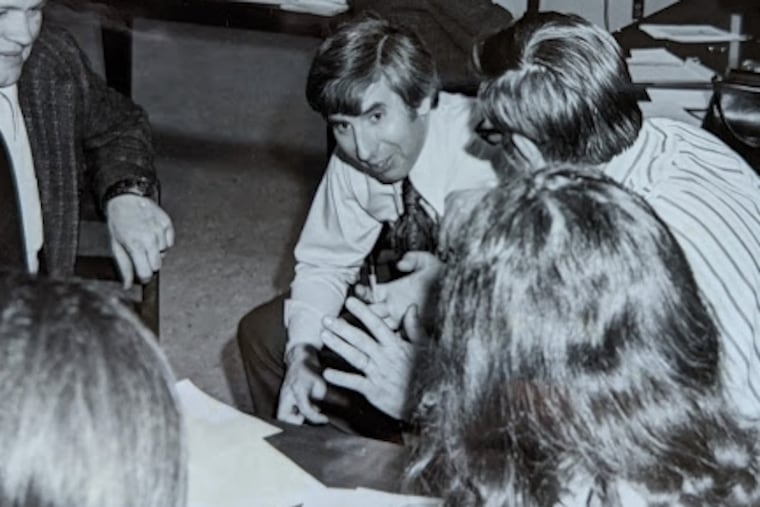Robert A. Bernoff, chemistry professor emeritus, former dean at Penn State Abington, and science education innovator, dies at 89
He helped usher in a new era of expanded opportunities for students at one of Penn State's largest suburban campuses and called his freshman class "Chemistry for Poets."

Robert A. Bernoff, 89, of Elkins Park, a pioneering professor emeritus of science and general chemistry and former dean and chief executive officer at the Abington campus of Pennsylvania State University, an innovator in science education, inventor, and worldwide lecturer, died Monday, April 18, of melanoma at Jefferson Health’s Abington Hospice at Warminster.
Dr. Bernoff served as the CEO at Penn State Abington, then called Penn State Ogontz, from 1979 to 1990 and helped launch the evolution of the small suburban Philadelphia campus into today’s Abington College at Penn State, a school that features four-year degrees in 23 majors, on-campus housing, and more than 3,000 students.
During his tenure, Dr. Bernoff boosted the school’s teaching budget, championed a diverse student body, and oversaw a faculty that had more full professors and award-winning teachers than every other Penn State campus except University Park. As a professor beginning in the 1960s, while others eschewed introductory chemistry classes to pursue research and institutional advancement, Dr. Bernoff embraced new students and became popular for his engaging lectures on topical issues and entertaining classroom demonstrations of chemical reactions and other scientific concepts.
He called his freshman class “Chemistry for Poets,” and, in his honor, the Dr. Robert A. Bernoff Award in science and engineering is presented annually at Penn State Abington.
Driven constantly to improve the quality of the education he provided as both professor and campus leader, Dr. Bernoff won grants from the National Science Foundation and other organizations and worked with experts from around the world to create better classroom curricula for students from preschool through college.
He shared his groundbreaking new programs, many of which featured unprecedented classroom experiments, with students at U.S. military bases overseas and elsewhere. He lectured locally and around the world, appeared on TV broadcasts, contributed to scientific literature, and was featured at cultural arts programs, conferences, symposia, and summits about science, education, global warming, nutrition, and other topics.
In 1962, while working as a scientist and researcher in the private sector, he and fellow inventor Fred D. Rosi received a U.S. patent regarding the improvement of thermoelectric devices. “He was incessantly curious about the world,” said his son Josh. “It was fundamental to his being.”
His wife, Sandy, said: “He had a way of hanging back, listening to others, and then condensing what he had learned into salient answers. He could see the end results.”
Born, Jan. 11, 1933, in West Philadelphia, Dr. Bernoff was class president and a top swimmer at West Philadelphia High School. He earned an athletic scholarship to Temple University and graduated with a bachelor’s degree and doctorate in chemistry.
He met Sandy Feinberg when they were teenagers, and they married in 1955, and had sons Josh and Andrew, and daughter Marjorie. He worked at first as a chemist, scientist, and researcher for Melcor Corp. and other companies, and his interest in innovation helped him succeed during the scientifically progressive 1960s.
“I don’t deny there is a certain amount of risk for the researcher who joins a small company,” he told a technology trade publication in 1962. “But greater personal and financial rewards are possible, too.”
He left private industry full-time for Penn State in the mid-1960s due to his talent in teaching and enjoyment of interacting with students but continued as a scientific consultant for years. Even after retiring in the 1990s, he lectured seniors and others on artificial intelligence, computerized genetics, fracking, and other scientific topics.
Dr. Bernoff was a skilled tennis player. He liked to read to his children and taught them about numbers and math when they were young. All three became teachers, and people he encountered throughout his life commented often on his influence in their lives.
“He was the nicest human being I ever met,” his wife said. “He was the best father and the best husband. He was kind and so respectful. He was a good soul.”
In addition to his wife and children, Dr. Bernoff is survived by five grandchildren and other relatives. A brother died earlier.
Services were Wednesday, April 20.
Donations in his name may be made online to Penn State-Abington, listing Bernoff Award under the “other” category. Mail donations, noting Bernoff Award, to 1600 Woodland Rd, Abington, Pa. 19001.